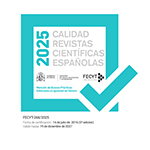Children of the Revolution: The opera Padilla or the Siege of Medina and the political culture of progressive liberalism between 1842 and 1846 in Madrid
Abstract
Progressive liberalism was articulated in the mid-nineteenth century in Spain as an ideological trend. For several reasons, it has remained hidden beneath other discourses which have hegemonized the history of political cultures. However, thanks to the increasing research on progressive liberalism, we have today a more detailed knowledge of this movement, both regarding the different factions that formed it and the public figures that adhered to it, especially the writers that combined art and business with the diffusion of the political principles that they shared. Based on these previous investigations, this article proposes a reading of the opera Padilla or the siege of Medina, premiered in Madrid in 1845, which considers spaces of sociability linked to music and the political culture shared by its authors: the writer Gregorio Romero Larrañaga and the composer Joaquín Espín y Guillen. Thus, this opera is contextualized in the delicate historical moment that led to the period known as the Moderate Decade, which favoured the use of specific symbols of progressivism —among others, the Comunero movement— with a clear communicative function. This contextualization is carried out in this article by using the press as the primary source and by placing the opera and its authors within the framework of three types of networks: social, media and intertextual ones. Ultimately, it shows that Padilla or the siege of Medina, a milestone in the development of Spanish national lyric theatre, was the result of artistic cooperation largely conditioned by political affinities.
Downloads
Article download
License
Aquellos autores/as que tengan publicaciones con esta revista, aceptan los términos siguientes:
a. Los autores/as conservarán sus derechos de autor y garantizarán a la revista el derecho de primera publicación de su obra, el cuál estará simultáneamente sujeto a la Licencia de reconocimiento de Creative Commons Reconocimiento-No comercial-Sin obra derivada 4.0 España que permite a terceros compartir la obra siempre que se indique su autor y su primera publicación esta revista.
b. Los autores/as podrán adoptar otros acuerdos de licencia no exclusiva de distribución de la versión de la obra publicada (p. ej.: depositarla en un archivo telemático institucional o publicarla en un volumen monográfico) siempre que se indique la publicación inicial en esta revista.
Plagio y fraude científico
La publicación de un trabajo que atente contra los derechos de propiedad intelectual será responsabilidad de los autores/as, que serán los que asuman los conflictos que pudieran tener lugar por razones de derechos de autor. Los conflictos más importantes pueden darse por la comisión de plagios y fraudes científicos.
Se entiende por plagio:
1.Presentar el trabajo ajeno como propio.
2.Adoptar palabras o ideas de otros autores sin el debido reconocimiento.
3.No emplear las comillas u otro formato distintivo en una cita literal.
4.Dar información incorrecta sobre la verdadera fuente de una cita.
5.El parafraseo de una fuente sin mencionar la fuente.
6.El parafraseo abusivo, incluso si se menciona la fuente.
Las prácticas constitutivas de fraude científico son las siguientes:
1.Fabricación, falsificación u omisión de datos y plagio.
2.Publicación duplicada.
3.Conflictos de autoría.












